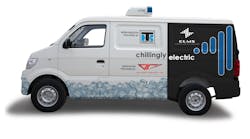ELMS, Thermo King partner on light-duty BEV for refrigerated delivery
With the growing demand for urban and suburban transport of perishable and frozen goods, startup battery electric-vehicle maker Electric Last Mile Solutions is launching a Class 1 refrigerated van due out by the end of 2021, using cooling technology developed by Thermo King. The prototype integrates Thermo King’s E-200 all-electric refrigeration unit into ELMS’ primary electric vehicle, the Urban Delivery, leveraging the performance and maintenance efficiencies of both, with applications including grocery, floral, and pharmaceutical deliveries.
“Thermo King has been working for the past few years on creating our all-electric, small vehicle refrigeration units, and we saw home delivery, even before COVID, as the new frontier in the cold chain,” said Paul Kroes, Thermo King market and technology insights leader to FleetOwner. “It's a very viable technology right now in a very viable combination.”
The Urban Delivery, assembled at Mishawaka, Indiana (with Thermo King's network of installers adding the cooling system after), has a cargo volume of 171 cubic-feet (empty and sans cooling unit) is more than a third larger than a Transit Connect cargo van’s, the Troy, Michigan-based ELMS noted. The battery pack provides 42 kWh for an estimated 150-mile range.
“Based on our data, the average duty cycle is 70 to 85 miles for last-mile delivery, so we're able to support these ancillary parasitic charges,” Justin Prann, ELMS chief revenue officer, told FleetOwner.
Even with the additional load on the battery from the refrigeration unit, users won’t see a drastic drop in that range. The key is the electric integration of the battery directly powering the E-200. Thermo King has offered all-electric units for 20 years. Multiple power conversions to run the fans and compressors inherently lowers the overall efficiency, Kroes explained.
“We have put a lot of work into making a very efficient refrigeration system that pulls as little power as possible from that battery pack, knowing that range is ultimately the critical factor in the end result,” Kroes said. “Most applications will consume 20% or less of the range from the vehicle.”
For typical fresh deliveries, a temperature of 35 degrees Fahrenheit is needed. Kroes estimated for frozen applications, the range reduction would be about 30%, because the unit requires twice as much energy to drop the temperature down to proper levels to transport frozen goods. In either application, the storage compartment will be pre-cooled when it’s plugged in to ensure the van is fully charged and chilly when the driver departs for the day.
Insulation is “more important than it ever” due to the balance between cooling and range, Kroes added, and Thermo King is working with upfitting partners to ensure insulation is durable and seals are performing optimally so holes aren’t created to allow heat to creep in.
An emphasis on driver behavior will also be needed, such as shutting off the system when opening the doors as to not draw in warm air from outside the vehicle.
Total cost of ownership
At its heart, Kroes said this marriage of Thermo King’s electric refrigeration technology and ELMS’s electric chassis technology provides fleets a platform that not only adheres to stricter standards for emissions and noise in urban transport but also offers a compelling total-cost-of-ownership case due to the all-electric operation.
The prevalent thought within the industry is that electric vehicles will need less maintenance due to fewer moving parts, but that’s only the beginning, Kroes said.
“The current technology with that compressor mounted to the engine is very susceptible to wear and tear, because if the engine RPMs really high, you can overstress the system; it's very hard to regulate,” he said. “Now, with a self-contained system that's running off of steady-state power input, the reliability goes through the roof compared to current architecture.”
Furthermore, a cooling unit that runs off gasoline may need engine idling during the delivery, which adds wear and tear to the engine, adding to maintenance expenses and decreasing overall life, whereas the battery can draw power with the engine off
The unibody also provides a simplified design easier to service, Prann said. “ELMS has a very expansive service support strategy in a partnership with Cox automotive, with mobile fleet support as well as storefront support.” Over-the-air updates will also improve visibility into maintenance and adjustments to performance as more data is collected
Overall for the Urban Delivery platform, ELMS anticipates the various efficiencies and cost of electricity will provide a "much lower" TCO over gas-powered units, with a $7/day advantage along with reducing CO2 by 58 lb. per day, compared to a gas van traveling 70miles. According to ELMS, Maintenance could be reduced by as much as 60%, providing a TCO improvement of 35%
This refrigerated version of the Urban Delivery van will be piloted by customers this summer and appear at the Home Delivery Expo in Philadelphia. Traditional pilots are also ongoing at the University of Notre Dame in South Bend, Indiana. Production is slated for Q3 of 2021 and ramp up through the rest of the year.
ELMS went public (Nasdaq: ELMS) on June 28.






